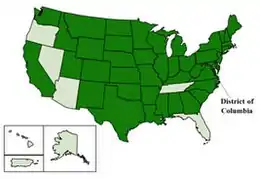2014 enterovirus D68 outbreak
In August 2014, enterovirus D68 caused clusters of respiratory disease in the United States. Cases of EV-D68 have occurred in the U.S. for decades, having first been detected in California in 1962. According to the Division of Viral Diseases at the National Center for Immunization and Respiratory Diseases EV-D68 "is one of the most rarely reported serotypes, with only 26 reports throughout the 36-year study period (1970 through 2006)."[2]

History
The outbreak began in 11, mostly Midwestern, states and was first confirmed in Kansas City, Missouri, and Chicago.[3] By mid-September there were 145 suspected cases, including Colorado, Louisiana, Alabama, New York, New Jersey, North Carolina, Michigan, Missouri, Iowa, Illinois, Montana, Kentucky, Kansas, Oklahoma, Indiana, Connecticut, Massachusetts, Rhode Island, and Wisconsin (Including one involving a previously asthmatic non-immunocompromised adult). In Canada in September 2014, 49 cases of the virus were confirmed in Alberta,[4] three in British Columbia, and over 100 in Ontario.[5][6] Health officials reported Los Angeles County's first case of viral infection on October 1, 2014. By October 2, 6 more cases had been reported in California: four in San Diego County, and one each in Ventura and Alameda counties.[7]
The CDC later reported that from mid-August to Oct. 10, 691 people in 46 states and the District of Columbia had come down with a respiratory illness caused by EV-D68. Five children died.[2]
Epidemiology
The outbreak is the largest ever reported in North America. Enterovirus infections are not rare; there are millions of isolated infections every year. One possibility is that CDC began looking for the virus only after the outbreak.[8] CDC received specimens for lab testing after the outbreak-related hospitalizations.[9]
The surveillance shows that a number of cases are admitted to the hospital each year.[10] The Midwest has been hit in this outbreak. [11] Previously in the United States, EV-D68 was uncommon. This outbreak represents a growth in the incidence.[12] [13]
Prevention
No vaccine for D68 exists currently. Prevention of the outbreak affecting oneself is possible by regular handwashing and other forms of infection control.[11]
References
- "Non-Polio Enterovirus Infection: States with Lab-confirmed Enterovirus D68 - CDC". Archived from the original on 12 October 2014. Retrieved 14 October 2014.
- "Is CDC Hiding Enterovirus Link To Illegal Alien Kids? 536 Comments". Investor's Business Daily. 2014-10-17. Retrieved October 22, 2014.
- "Severe Respiratory Illness Associated with Enterovirus D68 — Missouri and Illinois, 2014". Morbidity and Mortality Weekly Report (MMWR). CDC. 63(Early Release): 1–2. September 8, 2014. Retrieved 9 September 2014.
- Herriman, Robert (23 September 2014). "Confirmed enterovirus D68 cases in Alberta rise to 49". Outbreak News Today. The Global Dispatch, Inc. Retrieved 27 September 2014.
- "Enterovirus D68: 3 confirmed cases in B.C.'s Lower Mainland". CBC News. 16 September 2014. Retrieved 17 September 2014.
- Carville, Olivia (24 September 2014). "100 Ontario children infected with vicious EV-D68 virus". Toronto Star. Retrieved 25 September 2014.
- "Enterovirus D68: Eight California cases of rare illness; some patients suffer paralysis". Retrieved 14 October 2014.
- "Enterovirus D68 infections in North America". www.virology.ws.
- "Archived copy". Archived from the original on 2017-09-08. Retrieved 2017-09-08.CS1 maint: archived copy as title (link)
- Avoort, H. G. van der; Donker, G. A.; Benschop, K. S.; Meijer, A. (October 23, 2014). "Continued seasonal circulation of enterovirus D68 in the Netherlands, 2011–2014". Eurosurveillance. 19 (42): 20935. doi:10.2807/1560-7917.ES2014.19.42.20935. PMID 25358039.
- "4 Things We've Learned About Enterovirus D68, And 1 Mystery". NPR.org.
- "Enterovirus D68: How Did the Current Outbreak Begin?". Pharmacy Times.
- Oberste, M. S.; Frace, M.; Sheth, M.; Nix, W. A.; Brown, B. A. (December 24, 2014). "Seven Strains of Enterovirus D68 Detected in the United States during the 2014 Severe Respiratory Disease Outbreak". Genome Announcements. 2 (6): e01201–14. doi:10.1128/genomeA.01201-14. PMC 4239358. PMID 25414503.